Critics fear a new planning law will hand power to property developers and put Ukraine’s historic buildings at risk
Oleksandr Kolesnichenko is a journalist at Ukrainska Pravda, a Ukrainian news outlet
Cross-posted from Open Democracy
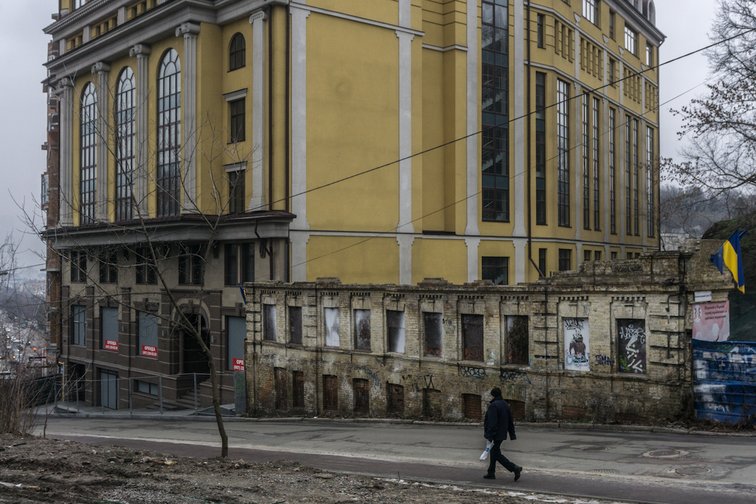
Image: Ivan Zaiets. All rights reserved – Residents of Dmytro Perov’s grandmother’s building in Kyiv, originally constructed in 1898, were evicted in 1979 – and the building fell into disrepair
At first, Dmytro Perov didn’t believe his grandmother’s stories about ancient caves beneath the courtyard of the 19th-century building where his family had once lived in Kyiv.
“I thought someone had just made it up,” the lawyer and activist told openDemocracy.
But plans to build a new residential complex on the site spurred him to investigate his grandmother’s story.
He had good reason to worry. Ukrainian officials’ ‘fast-track’ approach to developers’ plans – which is not without a whiff of corruption – has continued since Russia invaded the country. Indeed, activists say that the demolition of Kyiv’s historic sites has sped up during the war.
These new regulations, which were drawn up before the war, will hand unprecedented powers to Ukraine’s construction industry, critics say.
In November, Perov – who works for a group dedicated to the city’s heritage and often opposes the demolition of old buildings in court – and a group of friends found a complex of four caves at the abandoned and mostly ruined house where his grandmother had lived. It stands on the city’s central Voznesenskyi Uzviz, a street which connects two historic districts, Podil and Verkhne Misto.

Image: Facebook / Mykhailo Pohrebyskyi
Dmytro Perov in the caves beneath his grandmother’s house
|
Archaeologists have provisionally dated the caves to the era of Kyivan Rus – a state that existed from the ninth to the mid-13th centuries – or even to Ukraine’s pre-Christian period.
The caves’ discovery and subsequent public pressure has forced Kyiv city council to postpone its decision to lease the land to private developers.
“Perhaps this was a sign from God,” said Perov. “We found the caves just when the developer was about to get permission to build.”
Building boom
This rare, perhaps temporary, victory in the stand-off between activists and property developers over Kyiv’s historic sites stands in stark contrast to the norm in recent years.
Over the past decade, housing construction in Ukraine’s big cities has become one of the most profitable sectors in the country’s economy.
As a result, property developers have gained influence with city authorities and the Ukrainian parliament, finding themselves able to lobby successfully for land allocation to maintain their intensive building programmes.
In response, activist groups across Ukraine, but particularly in the capital, have fought back to protect 19th-century and Soviet-era buildings under threat of demolition. Green spaces, parks and even public access to Kyiv’s beaches on the Dnipro River are also under threat.
Public concern over the unchecked power of Ukrainian construction firms during wartime has even translated into popular humour. According to one joke: “No one in Ukraine believes in the armed forces as much as property developers.”
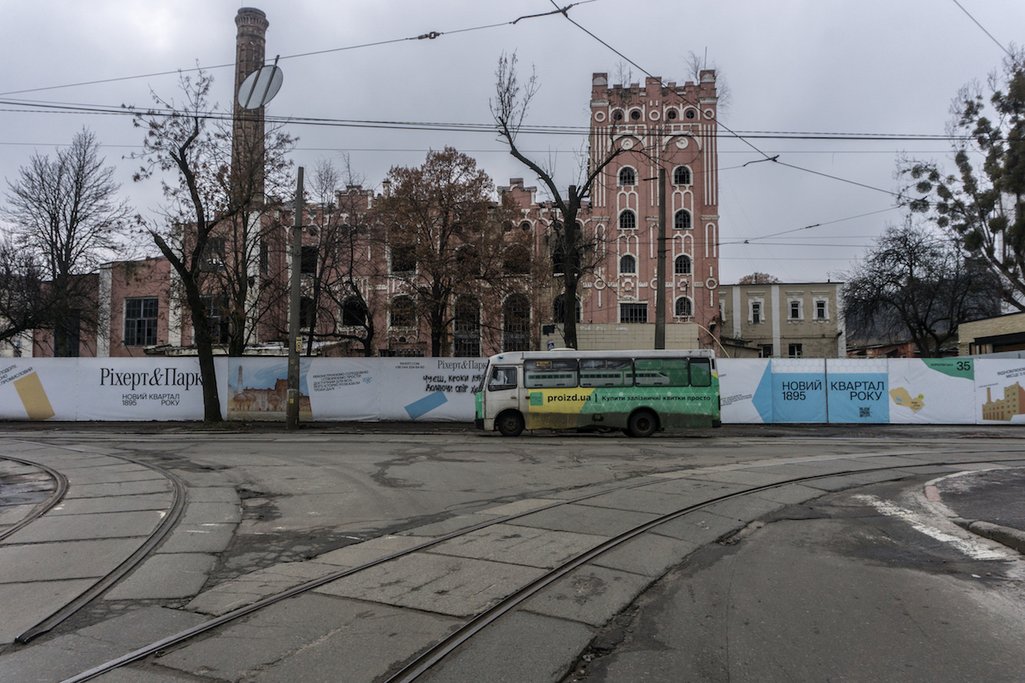
Image: Ivan Zaiets. All rights reserved
Activists often try to change or prevent property developers’ plans via protest or public campaigns
|
The threat to Perov’s grandmother’s home – now a historic site – is a typical story of the many loopholes used by property owners to start building without a full package of permits under current planning laws, activists say.
Communist authorities evicted Perov’s family some 40 years ago, in 1979, from their apartment in the three-storey building on Voznesenskyi Uzviz, because the land had been earmarked for new construction, but the work never took place. In the following years, the 1898 building fell into ruin. Today, only its facade remains.
In 2019, a Kyiv property company, Capital Real Estate, asked the city authorities to lease the land on which the remains of the building stand for the construction of a new multi-storey residential complex.
The company noted that it owned the ruined building. But Kyiv’s official property register has no information about the property on Voznesenskyi Uzviz – a ruin by the time the Ukrainian authorities took over land records from the Soviet Union. And the Kyiv city administration’s municipal property department said that it had never issued a certificate of ownership for this address.
On this basis, Perov claims that the company received ownership documents unlawfully. The issue is currently under investigation by local police.
Capital Real Estate did not respond to openDemocracy’s request for comment. However, according to Perov, Capital Real Estate claims that the property was registered in 2017 and so the criminal case is illegal because the three-year time limit for filing a lawsuit has expired
Out with the old
Today, Ukrainian citizens can challenge potentially illegal construction through the courts. Activists also used to protest at construction sites, but that is forbidden under martial law at present.
But in six months’ time, Ukrainians could lose their right to take legal action too, when the new law on urban planning reform comes into force.
This law significantly restricts the routes for granting protected status to a historic building or returning a property to municipal ownership. Under the new legislation, such actions will be interpreted as an infringement of the owner’s rights.
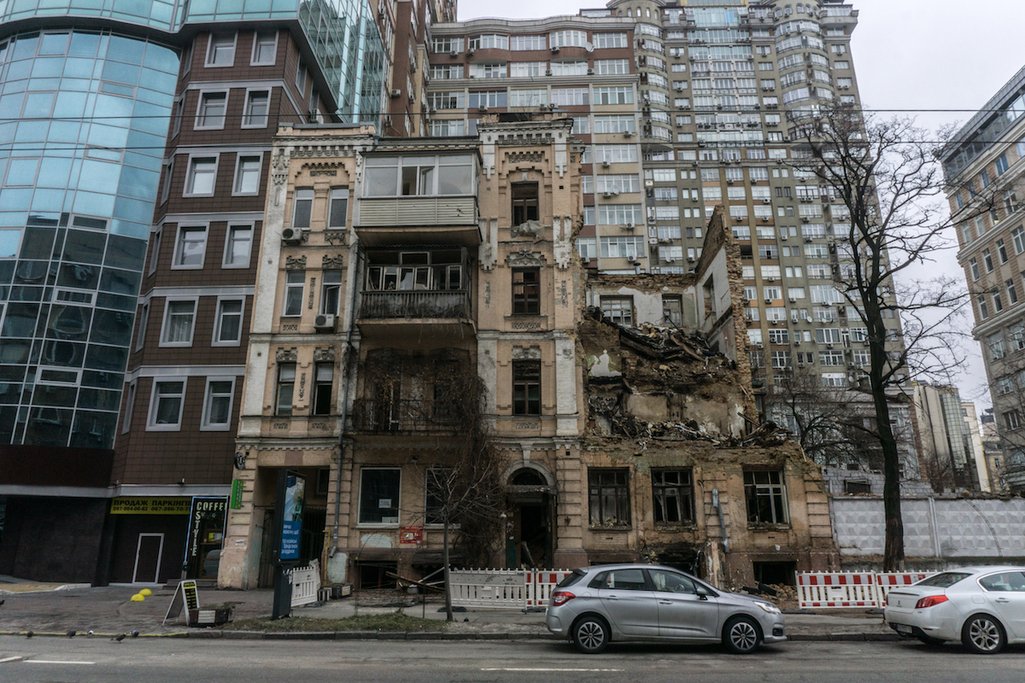
This 120-year-old Kyiv building was hit by a Russian rocket attack on 17 October – and a month later, a fire broke out, causing further damage
Image: Ivan Zaiets. All rights reserved
Perov fears that all current court cases on property conflicts will be annulled, as developers will use the new law to appeal for cases to be thrown out.
He is also concerned about the long-term impact of this law. He told openDemocracy that out of 3,000 historic buildings in the Ukrainian capital, only a third have protected status.
“This means that 2,000 historic buildings, most of which are privately owned, are under threat of destruction. [Under the new law] anyone will be able to buy a little old house, demolish it and build a skyscraper,” he said.
Perov noted that it’s likely that more historic buildings were demolished in Kyiv this year than in 2021.
“Before the war, historic buildings were destroyed to make way for specific developments. Now it is done as a proactive step,” he explained. “It will be much easier to work with plots of land rather than buildings after the war. [Land] is a more liquid asset.”
Architects under attack
Ukrainian activists keen to protect historic buildings are not the only ones who appear to have fallen out with the country’s property developers, keen to restore revenues that have fallen dramatically as a result of the economic collapse brought about by the invasion.
In November, the Security Service of Ukraine (SBU) searched the premises of Ukraine’s National Union of Architects, as well as the companies and homes of the union’s management. The SBU said the search was part of an investigation into alleged interference with a national digital planning system and that the union had allegedly issued professional certifications to unqualified persons.
One of the directors of the architects’ union, Anna Kyrii, believes that the law enforcement attention amounts to Ukrainian politicians’ “revenge” against architects over their criticism of the new urban planning reform.
Kyrii said the new law passed on 13 December has been adopted in an attempt to “redistribute the levers of influence” in Ukraine’s construction and planning industry.
Under current regulations, if the architect responsible for a property development disagrees with a developer over significant changes – such as using cheaper materials or efforts to bypass building codes – then they can report the dispute to a state inspectorate, which can conduct an investigation.
The new law will change the procedure for solving such disputes: if an architect refuses to make the changes a developer wants, under the new law the developer would be able to apply to a new urban planning chamber attached to Ukraine’s newly created Ministry of Communities, Territories and Infrastructure Development.
If the developer does not receive consent or refusal within 30 days, they receive approval for their changes by default.
“In fact, there is nothing about urban planning in this bill,” Kyrii said.
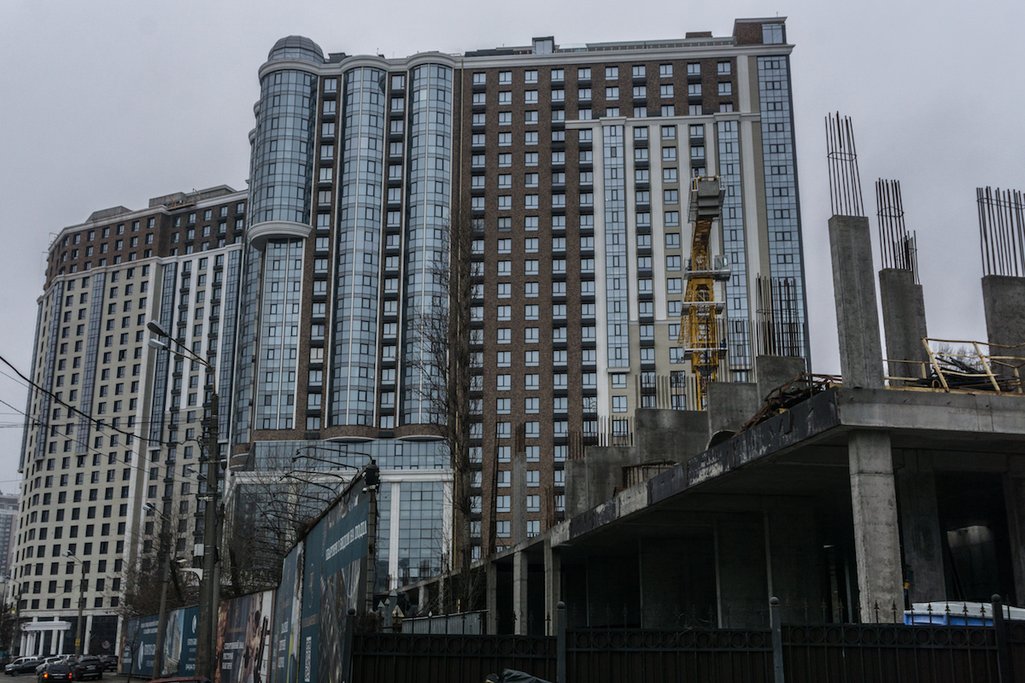
Image: Ivan Zaiets. All rights reserved
Disruption and loss of access to public space resulting from development has become a new source of activism in Ukraine over the past 10 years
|
Indeed, opponents of the law argue that it simply strengthens the role of the Ministry of Communities, Territories and Infrastructure Development. The ministry will have the sole authority to issue tenders for construction and set conditions for those tenders, decide who will have access to the market, certify architects and resolve disputes.
What is more, under the new law private inspectors will replace state planning officials in issuing planning permits and certifying that a building is ready for use. It is feared that this could lead to developers registering their own permit companies – for example, via friends or family members.
“The worst thing in this situation is that the state is removing any form of responsibility over property development,” Kyrii contends. “Private developers, private building evaluations and private oversight – without a single form of oversight on developers from the state.”
Most in the construction industry support the new law. Serhiy Pylypenko, CEO of the largest producer of concrete in the Kyiv region, the Kovalska Group, believes that the new law will complete a long-awaited reform of how state agencies monitor and regulate urban planning and construction – and eliminate corruption in the sector.
He points out that the new provisions will devolve decision-making on construction issues to lower levels of government, while introducing criminal liability for unlawful construction or violating conditions of land use.
“[The law] will make it possible to speed up all the processes that artificially hindered the development of the construction industry and had a negative impact on the economy,” Pylypenko said. He described criticism of the law from Ukrainian architects and public organisations as “far-fetched” and “unfair”.
Hasty lawmaking
Like other potentially controversial laws passed during wartime, Ukraine’s new law on urban planning was developed before the Russian invasion – and then rushed through Parliament with apparently little oversight.
Property developers contributed to its writing through their lobbying organisation, the Confederation of Builders of Ukraine, organising meetings with individual parliamentarians and attending special meetings at Parliament.
Before the war, the legislation had significant support in the Ukrainian parliament, but recently the numbers of MPs ready to support it had dwindled to only 228 (the law requires 226 votes – half of the chamber – to pass).
Originally a bill with 300 pages of amendments to four different existing laws, and a comparative table of changes running to 2,000 pages, the final draft was not published on the Ukrainian parliament’s website before the final vote on 13 December – nor after the vote. Standard procedures, such as preliminary discussion or amendments from the chamber floor, were also not observed. As of 28 December, the law has still not been published.
openDemocracy attempted to contact the bill’s main author, MP Olena Shulyak, to understand why the law had to be passed so quickly, but did not receive a response.
Writing online, Shulyak, who heads the ruling Servant of the People party, claims that the law will digitalise and simplify the construction procedures for Ukraine’s post-war reconstruction.
“We don’t have the moral right to leave urban planning in the state it has been in. Particularly ahead of [post-war] reconstruction, using state funds and the funds of international partners,” Shulyak wrote.
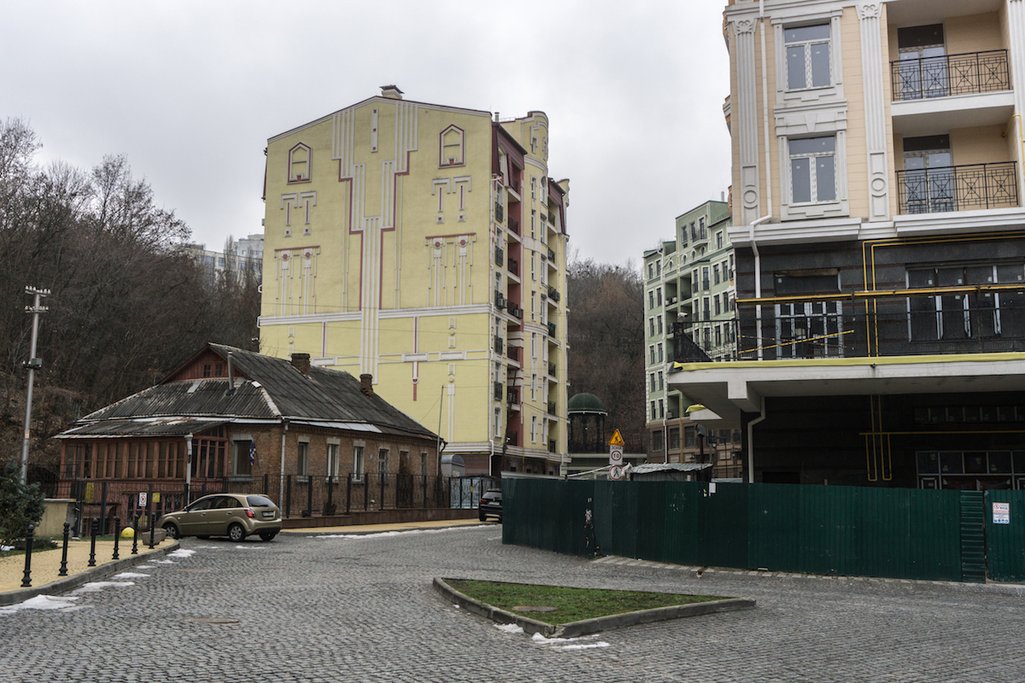
Ukraine’s new “urban planning” law is set to shift significant powers to property developers over state institutions and architects
Image: Ivan Zaiets. All rights reserved
But Anna Kyrii, from the architects’ union, is convinced that the planning law was rushed through Parliament and passed on 13 December because the ruling party could still rely on votes from MPs from pro-Russian parties that were banned earlier this year on that date. The voting records show that the law could not have been passed without votes from these MPs.
The following day, MPs from the ruling party started collecting signatures in support of removing mandates from MPs belonging to pro-Russian parties – a move that the Ukrainian public has called for since the February invasion.
Changes of heart
Meanwhile, some of Shulyak’s party colleagues who journalists have previously linked to property developer interests changed their position on the eve of the vote, publicly calling on MPs to oppose the bill.
Anna Bondar, a former building official who is also an MP from Ukraine’s ruling party, withdrew her signature from the draft law. She claimed it would lead to private companies being in control of issuing most building permits, and that local government would have its planning powers reduced.
The legislation has now been passed to President Volodymyr Zelenskyi to sign into law – or veto, as more than 42,000 people have asked via an online petition. Ukraine’s minister of communities, territories and infrastructure development, Oleksandr Kubrakov, supports the law, and is believed to have a good relationship with Zelenskyi: media reports tip him as a possible candidate as a future prime minister.
Ukrainian society has long been indignant at how property developers act, particularly when they break laws, build in cities’ green areas and cause disruption to city life. All these were frequent sources of public contention before the Russian invasion.
MP Dmytro Hurin, another dissenter from the Servant of the People party who journalists have previously linked to property developer interests, argued that the new law has little to do with post-war reconstruction.
“This is definitely not how victors should rebuild,” he said.
You decide if we close down BRAVE NEW EUROPE and the Gig Economy Project
We have set a goal of 20,000 GBP/Euros. If we do not reach this, we will continue as long as the funds last then close down the website.
Thus we are letting you decide. If you want the site to close down, then don’t donate. If you want them to survive and flourish then donate HERE


And thus the interest of BlackRock reported yesterday. Shouldn’t surprise anyone at this point on who europeans will fund the profits of while some more colonialism is applied.